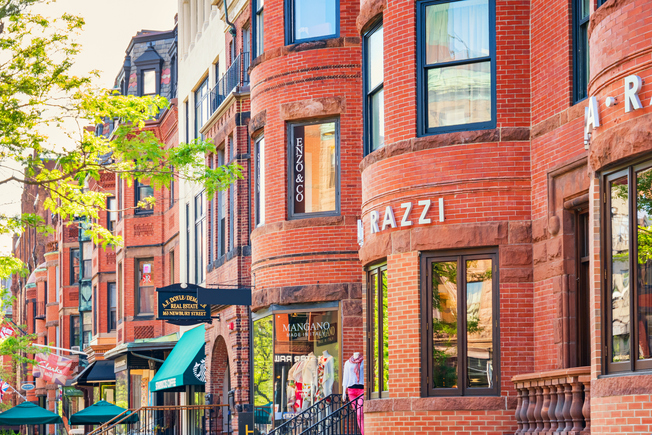
What are the Pros and Cons of Renting from a Private Landlord?

By Lilly Milman
Jul 23, 2024
As you begin apartment hunting, you’ll encounter two different kinds of landlords: professional property management companies and smaller private landlords. The experience of renting an apartment from each kind is actually quite different — so it’s important to do your homework and figure out which option is right for you before signing onto a year-long lease. To help in your decision, we’ve crafted this guide outlining the pros and cons of renting an apartment from a private landlord over a property management company.
What is a private landlord?
A private landlord is someone renting out a property that they own by themselves, with no assistance from a property management company. Picture this: Someone bought an apartment in the city where they were living, spent a few years residing there themselves, and then moved elsewhere and started renting that apartment out. That’s a private landlord. A private landlord may also be someone who owns investment properties and rents them out, but on a small enough scale that they don’t need to hire a company to help them manage their rentals.
How can you identify a property being rented by a private landlord?
You’ll usually find rental properties owned by private landlords in condo buildings or smaller multifamily homes, like townhomes, brownstones, duplexes and triplexes. Another popular rental option owned by private landlords is a room in a single-family home, an entire single-family home, or an ADU (accessory dwelling unit) also known as an in-law apartment.
So, if you’re using an apartment search website like ApartmentAdvisor, one tell-tale sign that a property is being put up for rent by the owner is if only one or a couple of units in a building are listed, if every unit in a building looks completely different, or if the property is a condo, single room, single-family home, or ADU.
If you are walking through a neighborhood in person, look for lawn or window signs that say “For Rent” with a phone number hand-written or “For Rent By Owner” (often abbreviated to “FRBO”).
An individual owner may also be more likely to hire the services of a real estate agent, especially in cities like Boston or New York where it’s very common for renters to work with brokers, while a professional property management company will likely have a leasing office with their own in-house leasing agents who you will work with to set up a tour, apply, and secure a rental.
What are the pros of renting a property from a private landlord?
If you’re unsure about renting a property from a private landlord, consider the following benefits:
- More flexibility on lease terms. When you rent from a private landlord, you interface with a human being when it comes to your apartment and your lease. Human beings tend to be more flexible than large companies when it comes to lease terms. For example, if a unit for rent by an owner says no pets, there’s a chance that they’d be open to small dogs or cats for the right tenant. Meanwhile, in a larger building owned by a company, they may have a no-pet policy across all units that they are unwilling to bend on.
- Room for price negotiation. On a similar note, when it comes to rent price (especially for lease renewals, once you’ve established a good tenant-landlord relationship), there’s a little more wiggle room with a private landlord. Property management companies are more likely to use data and algorithms to price their properties and may have a policy of raising rents by a certain percentage each year. A private landlord may be more amenable to negotiating rent, keeping the rent price the same for multiple years, or minimizing rent increases, to keep the right tenant in their unit.
- Opportunity to foster a relationship. If you are a person who thrives on personal relationships, then you’ll have much more luck forming one with a private landlord than with a property management company. They may live nearby or even in the same building and will likely be your only point of contact for all apartment needs, cutting out any middleman. This kind of direct communication is a pro for some but may be a con for others.
- More unique rental units. This isn’t a hard-and-fast rule, but in larger buildings owned by one company, you are more likely to see identical (or near-identical) units. In a small double- or triple-decker, condo building, ADU, or single-family home, you are more likely to see apartments that are individual to the owners’ taste with different architectural features.
What are the cons of renting a property from a private landlord?
If you’ve toured an apartment that you love, but want to be extra sure about your decision to rent from a private landlord, just make sure that you consider the following drawbacks before you sign the dotted line:
- Less streamlined processes. The pro of working with a large property management company is that they’ve likely worked all the kinks out of their systems. That means you can benefit from digital advances like an online application process, maintenance requests, and rent payment. Meanwhile, with a private landlord, they may be more analog; so, expect paper applications, sending rent by check in some cases, and communicating via text or email rather than through an online portal. On the flip side, there may also be a less invasive tenant screening process.
- Less building amenities. If you are renting a unit from a private landlord, you are less likely to benefit from common apartment building amenities like a mail or package room, a gym, or a pool. A condo building may have some amenities open to renters, but a unit in a smaller multifamily property likely won’t. So, if you are looking for your building to provide much more than just lodging, then you may not find the right fit with a private landlord; in that case, look at larger apartment complexes instead.
- Less privacy. You may not like living in close quarters with your landlord if their private residence is another unit in the same building. Because you’ll know your landlord on a more personal level — and talk to them directly — you and your living situation will be more on display than if you were in a larger, professionally managed building. Your landlord may be coming over themselves more often to do maintenance, check on things, collect payments, or give updates — and that is a con for some people.
- More responsibility for the unit or building. Because there won’t be an in-house staff whose job it is to tend to the building every day in many cases, you may have to do more of the legwork with your rental home. This may involve shoveling snow, lawn care, or sweeping walkways and stairwells.
What to Know When Renting from a Private Landlord
For some people, a private landlord can be the perfect fit. However, there is some level of uncertainty when it comes to a private landlord as it may be harder to find online reviews or speak to former or current tenants about the property. Here’s a few ways to do your due diligence before renting from a private landlord:
- Look up the property records for your city to make sure that the landlord you are speaking to is, in fact, the owner of the unit. This will help you avoid a potential rental scam.
- Read the terms of the lease agreement carefully. You don’t want to end up renting from a property owner whose needs don’t align with your own, so read every clause of the rental agreement. A few things to specifically look out for are clauses surrounding maintenance issues, right to entry, and causes for eviction.
- Try to look up the rental history, if possible. Like we said, you may not find a slew of online reviews for your apartment, building, or future landlord. However, it’s always worth a shot.
The Bottom Line
A private landlord is someone who rents and manages their property on their own property, without the help of professional management services. They can be more flexible than large property management companies, but come with their own set of drawbacks as well. Hopefully, by the end of this guide, you are feeling more knowledgeable about whether or not a private rental is a good choice for you.
Top cities
Atlanta Apartments
1,578 apartments starting at $700/month
Austin Apartments
5,143 apartments starting at $500/month
Baltimore Apartments
1,323 apartments starting at $475/month
Boston Apartments
5,630 apartments starting at $1,050/month
Charlotte Apartments
2,871 apartments starting at $560/month
Chicago Apartments
6,335 apartments starting at $638/month
Dallas Apartments
5,623 apartments starting at $595/month
Fort Worth Apartments
2,639 apartments starting at $500/month
Houston Apartments
5,499 apartments starting at $618/month
Las Vegas Apartments
1,085 apartments starting at $650/month
Los Angeles Apartments
11,202 apartments starting at $430/month
Miami Apartments
484 apartments starting at $1,200/month
Milwaukee Apartments
1,177 apartments starting at $595/month
New York Apartments
5,154 apartments starting at $1,000/month
Oakland Apartments
781 apartments starting at $950/month
Orlando Apartments
845 apartments starting at $940/month
Philadelphia Apartments
3,118 apartments starting at $500/month
Phoenix Apartments
4,215 apartments starting at $600/month
Pittsburgh Apartments
767 apartments starting at $450/month
Portland Apartments
2,115 apartments starting at $750/month
Raleigh Apartments
1,243 apartments starting at $550/month
San Antonio Apartments
3,600 apartments starting at $574/month
San Diego Apartments
2,847 apartments starting at $650/month
San Francisco Apartments
484 apartments starting at $830/month
San Jose Apartments
425 apartments starting at $1,100/month
Seattle Apartments
3,286 apartments starting at $650/month
Tampa Apartments
803 apartments starting at $812/month
Washington DC Apartments
2,249 apartments starting at $910/month


